- Destinations

How Bali economy was impacted by lack of tourists during Covid
The Covid pandemic decimated the global economy — but few places struggled as badly as our beloved Bali, with locals fighting to survive.

Bali looks to drastically hike entry fee
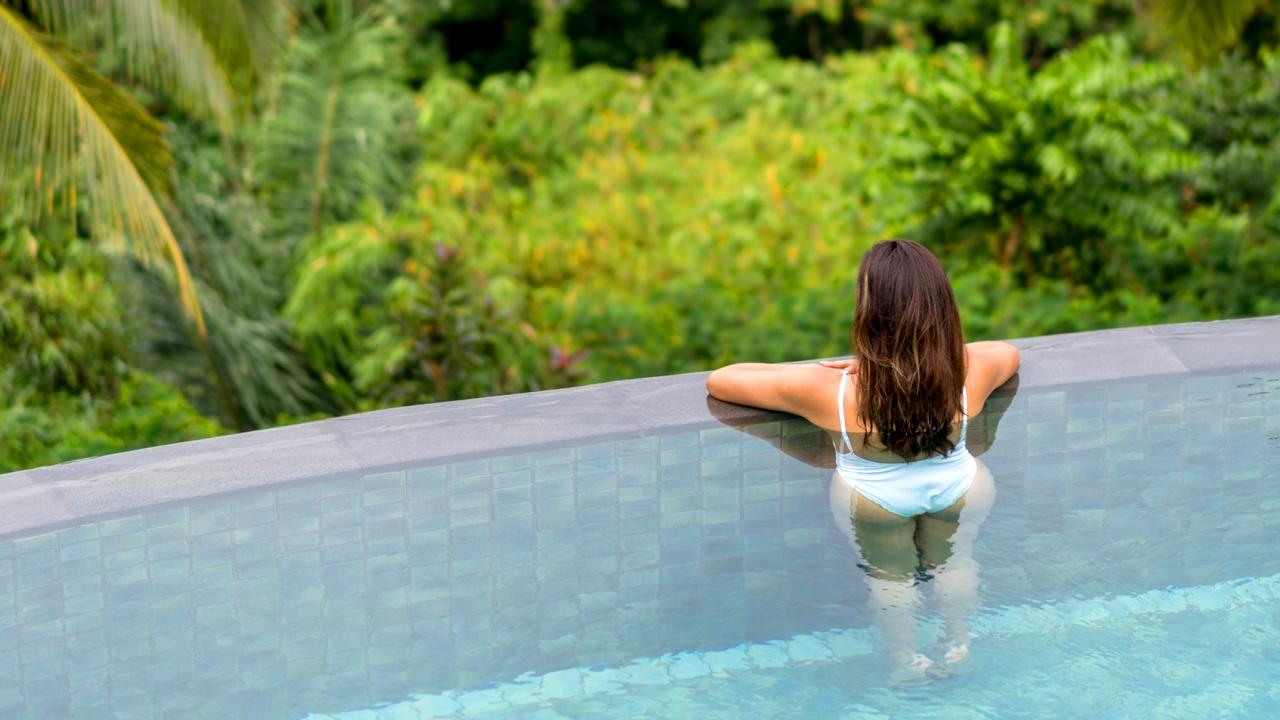
Silly mistake that cost me $500 in Bali
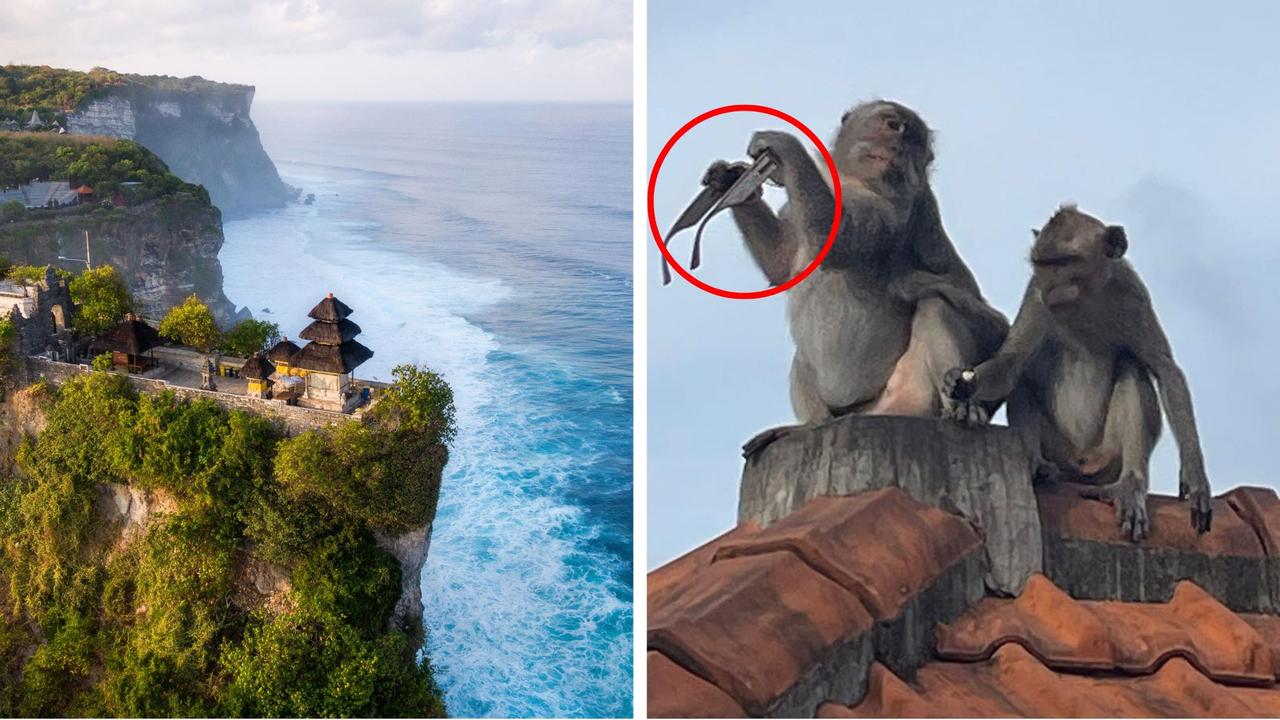
Major call for infamous Bali monkeys
It’s been a rough two years for most of the world with the coronavirus pandemic decimating global economies and leaving nations reliant on tourism floundering.
And few have been impacted as heavily as our beloved Bali — one of Australia’s most favourite places to escape to pre-pandemic.
Before the pandemic brought international travel to a grinding halt and countries slammed their borders shut, more than 1.3 million Australians descended on Bali in 2019, injecting billions into the local economy.
But two years later, the pandemic has had a devastating effect on the Indonesian island, with local businesses and tourism operators telling news.com.au they had faced a relentless battle to survive.
The once-bustling island is a shell of what it once was.
Seminyak’s busy maze of streets, once filled with boutiques and shop owners joyfully bartering for a sale, are dead and devoid of cars and people.
Want a streaming service dedicated to news? Flash lets you stream 25+ news channels in 1 place. New to Flash? Try 1 month free. Offer ends 31 October, 2022 >
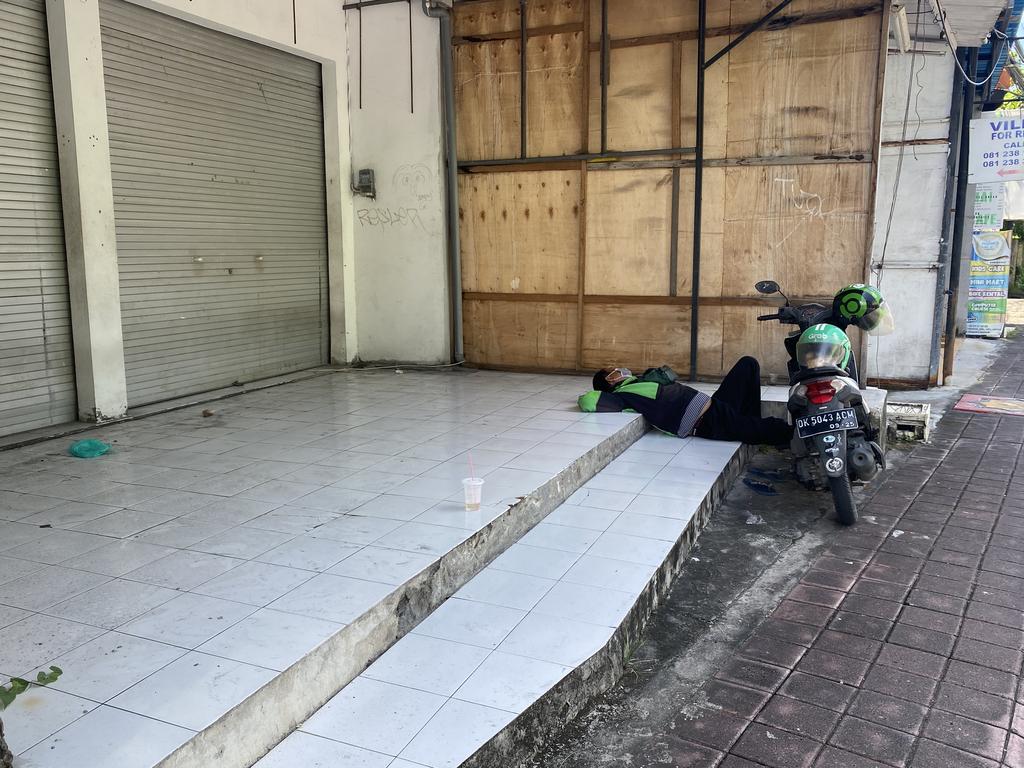
Shop windows are boarded up and other businesses have been abandoned altogether.
“For Lease” signs are pinned to most shopfronts and the beachside hotel pools, once teeming with sunburnt Aussies partying the days away, are empty.
A local jewellery shop employee, whose shop was the only one open in the street, said the past two years had been “not good”.
“We barely see anybody, it’s so quiet. Nothing is open. Most of the people I know haven’t been able to work. We are one of the only places that managed to stay open,” she said.
Local tour guide Tree told news.com.au she had spent the past two years doing what she could to survive by making snacks and selling them to local shops.
“Please, please come back to Bali,” she said.
“We are ready for Aussies.”
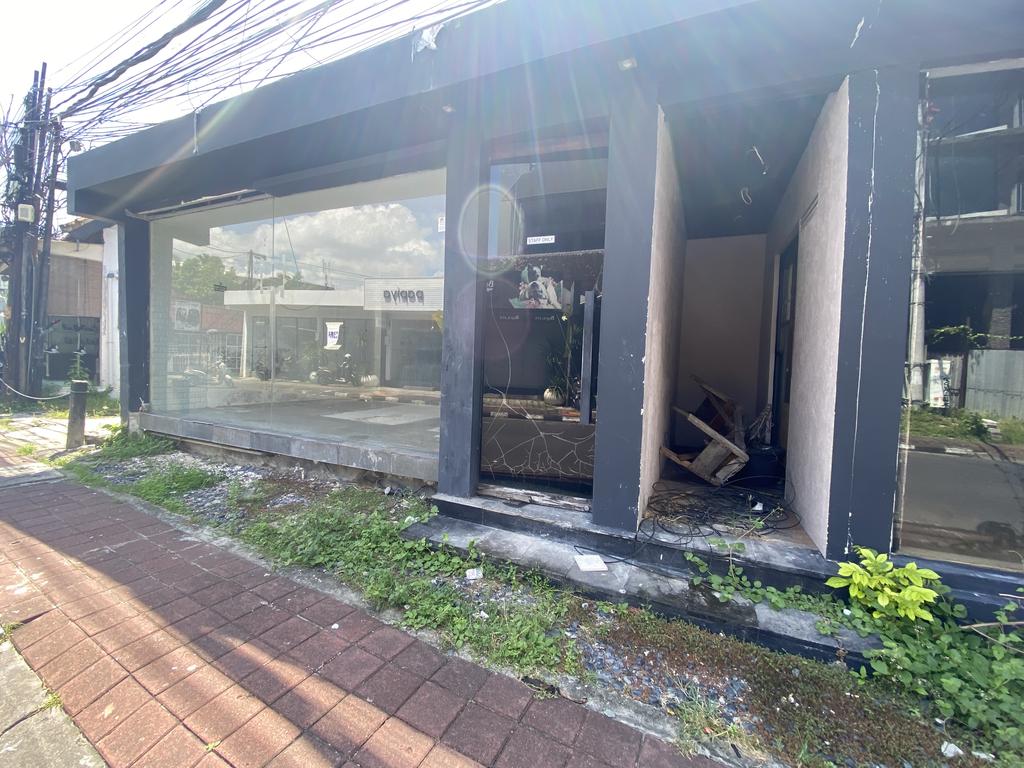
Tree also urged Australians to be fair with the Balinese people when they return.
“Before the pandemic, the shops would charge maybe four or five times the price but now they’re not. They know they need to build that trust and relationship back with the Aussies so you can barter a little bit but please don’t do it too much,” she said.
One potential positive to come out of the pandemic was the drop in traffic jams on the island.
Tree said streets that used to take 30 to 45 minutes to pass through instead were taking five minutes.
“But this is just because all the shops are closed,” she said. “We hope everything will come back the way it was before.”
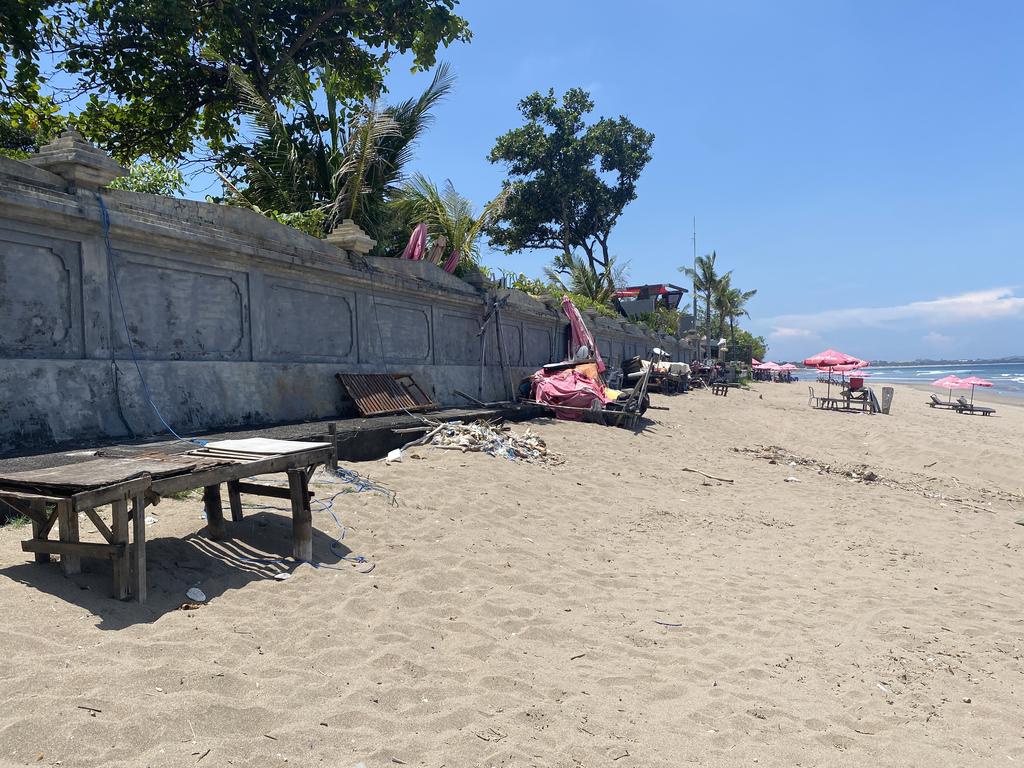
Other local tourism operators returned to agriculture to survive the pandemic by farming chickens, pigs, vegetables and fruit for money.
Andy, a local hat seller who has spent more than a decade selling hats on Seminyak Beach, said he had to turn to friends in Australia for help.
“My god, it has been really, really bad,” he said.
“It has been very hard on me and my family, my wife and my two kids.”
Andy asked a friend from Australia to send him small amounts of money.
“So we could eat,” he said.
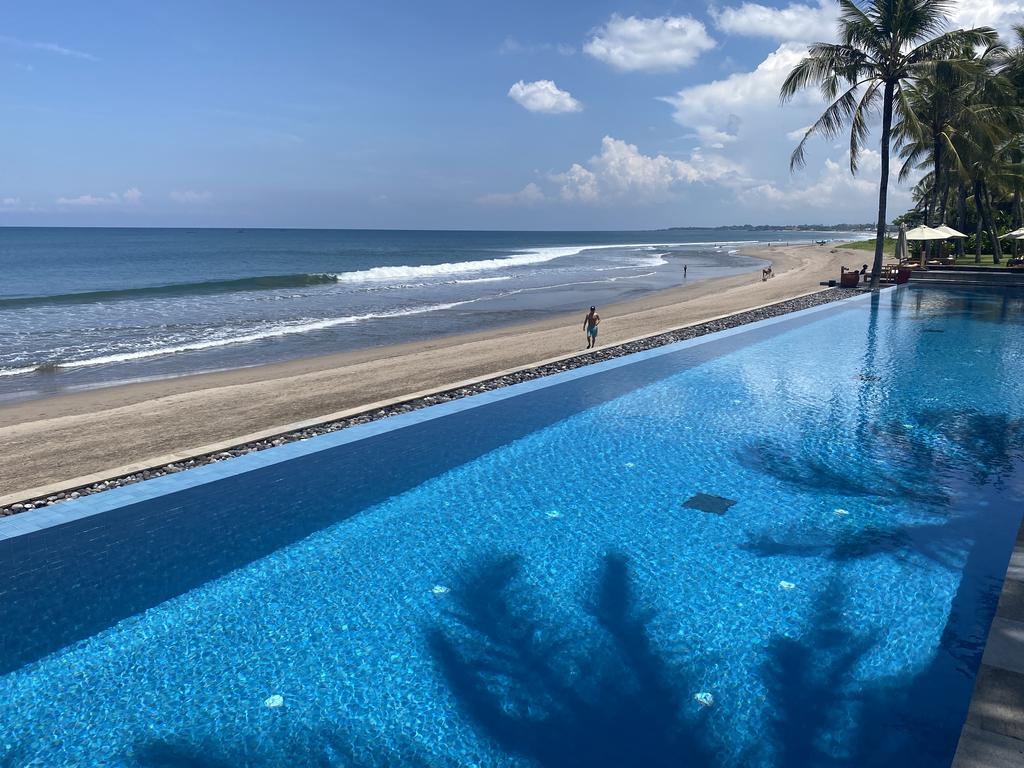
Some places have managed to weather the storm by focusing on local events and local tourists.
The Westin at Nusa Dua, a hotel set in a popular beach enclave on Bali, was booked out for the rest of the month thanks to a local motorbike event.
And some areas of Bali are still thriving — especially the region of Canggu, which is where most Aussie expats call home and run their businesses.
Jetstar also has high hopes after it dropped a $99 flight sale to Bali earlier this month and sold more than 40,000 fares in a single day.
The budget airline restarted direct flights between Australia and Bali’s Denpasar International Airport on March 15.
Pre-Covid, Jetstar operated up to 85 return flights a week to Bali.
More Coverage

The airline will start slow this month, operating three flights a week from Melbourne before ramping up their scheduling in the lead-up to Easter.
Bali flights from Sydney and Perth are scheduled to recommence in early April, with flights from Brisbane, Adelaide, Cairns and the Gold Coast scheduled for May.
This journalist was in Bali as a guest of Jetstar.
Aussies planning a trip to the hotspot may soon have to cough up almost $100 to enter the island with arguments the current fee is “too low”.
This Aussie traveller made a mistake in Bali that saw her fined $500 – but it could have been a lot worse.
The managers of a renowned Bali tourist attraction have made a major call on the site’s mischievous resident long-tailed monkeys.

First Person: Surviving Bali’s COVID tourism crash
Facebook Twitter Print Email
Dekha Dewandana ran a thriving ‘homestay’ tourism property in Bali, and received UN-supported training which has helped him to maintain a high standard of hospitality. When COVID-19 hit Indonesia, his business was pushed to the verge of collapse and, after a bruising two-year period, it’s now slowly recovering.
“When my parents passed away, I followed their wish for me to take care of our family home in Sudaji Village.
At that time, the village was already known as a tourism destination thanks to its cultural traditions and scenery and, in 2014 I started to realise my dream to develop homestays, where tourists stay with local families, in my village.
I was fully confident that I could succeed, based on my tourism and hotel background. I observed the operations of homestays and learnt how to transform my house into one.

It was a success; my homestay, Esa di Kubu, was chosen by the Bali Tourism Office to represent Sudaju Village in a national tourism award, and was awarded second prize.
Afterwards, the Bali Tourism Office recommended that I take part in the International Labour Organisation’s Sustaining Competitive and Responsible Enterprises (SCORE) hospitality coaching programme.
The programme helped us to ensure that our facilities and equipment reached accepted ASEAN (Association of Southeast Asian Nations) regional standards. We learnt about professional bedding, toiletries, food presentation, guest services and so forth. Every month, the trainer would coach us, and evaluate our progress.
The training also taught us the importance of digitalization and digital marketing, and I began promoting my homestay online. As a result, sales and visitor numbers increased, and I received high ratings on online tourism platforms.

‘We were all panicked and worried’
Then, at the end of 2019, COVID-19 hit. From January 2020, foreign guests began cancelling, and by March, when the Indonesian government declared a pandemic in the country, we had only five guests left, all of whom had found themselves trapped in Bali.
At the beginning of the pandemic, we received health protocol training from the ILO : we were taught how to protect ourselves by observing measures such as maintaining physical distance, using masks, and washing our hands. We maintained the protocols with the trapped guests, who continued to stay while finding ways to be repatriated.
Due to the global and national lockdown and mobility restrictions we had no guests and no income. We were all panicked and worried. I used my savings to buy daily needs, particularly food: I bought as much rice and instant noodles as possible, because the stores and markets were closed down.
I was contacted by my former overseas guests, asking about my condition and offering some help, which I felt grateful for. Their support helped my family to survive until the end of the 2020.
The first seven months of 2021 were the most difficult. We were planting vegetables to survive, but my fellow villagers and I barely ate during that period, and I began to lose hope.

‘My homestay has become alive again’
Eventually, conditions improved, restrictions were lifted, and we received assistance from the government. I never forgot about my homestay dream during this period, during which I repainted and fixed up the house.
Foreign visitors began to return, and in January 2022 I received a group of tourists from Denmark and Switzerland.
I’m glad that my homestay has become alive again.
As well as running my business, I am one of the founders of Sudaji Homestay, a group for homestay owners who have completed the ILO hospitality coaching programme.
Not all the homestay owners can speak English or have an understanding about marketing and digital marketing, and the group is there to share knowledge, and help members to maintain standards for their homestays.
I share my skills and knowledge so that we can continue to maintain our reputation as one of Indonesia’s leading tourism village, so that my fellow villagers do not have to find jobs elsewhere.”

Supporting the tourism industry at the ILO
- Dekha Dewandana is a beneficiary of ILO’s SCORE HoCo Programme, a programme sponsored by the Swiss Government. It is an ILO global programme that improves productivity and working conditions in small and medium enterprises (SMEs).
- The tourism sector is a major driver of economic growth, enterprise development and job creation, particularly for women, youth, migrant workers and local communities.
- Tourism was one of the industries hardest hit by the COVID-19 pandemic. Its impact on enterprises, especially micro, small and medium-sized enterprises (MSMEs), is unprecedented.
Six weeks after reopening, Bali wonders where the tourists are
Indonesian island’s unique culture and natural beauty not enough to overcome stress and worry of travel during COVID.

Pererenan, Bali – Before the pandemic, Dicky, who like many Indonesians goes by only one name, earned up to $20 a day hawking shell craft jewellery to tourists on the crowded beaches of Bali’s southwest coast.
But nearly two months after Indonesia reopened its doors to visitors from China and 18 other countries, the international tourists Dicky once relied upon for sales are still few and far between.
Keep reading
Bali reopens to tourists, but no direct international flights yet, ‘just skin and bones’: bali elephants left to starve, could bali’s unvaccinated visitors create a new covid hotspot, bali hit by ‘oxygen crisis’ as indonesia’s covid struggles rise.
“I came here at eight in the morning and have been walking up and down the beach all day. I try, try and try but I have not sold a single piece all day,” he told Al Jazeera as a blindingly beautiful blood-red sun set over the Indian Ocean at Pererenan Beach last weekend. “I don’t understand why more tourists aren’t coming now that Bali is open again.”
Dicky is not the only person on the island perplexed about the fact that not a single international flight has landed in Bali since the international airport reopened on October 14. The island’s COVID-19 metrics – just about the lowest recorded since the start of the pandemic – only add to the conundrum.
According to Indonesia’s National Board for Disaster Management, the seven-day average for new positive cases in Bali now stands at 11, the seven-day average for deaths is just one while the seven-day positivity rate for individuals tested is 0.17 percent – well below WHO’s minimum threshold of 1 percent for territories it classifies as having the virus under control. Vaccine numbers are also well above the world average of 42.7 percent, with more than 77 percent of all adults fully vaccinated in Bali, according to Indonesia’s Ministry of Health.
But six weeks after the country reopened, only 153 people around the world had applied for tourist visas, according to Indonesia’s Directorate General of Immigration.
The low level of interest reflects a survey by the International Air Transport Association that showed 84 percent of people have no interest in holidaying at destinations that require quarantine, and Indonesia imposes a mandatory hotel quarantine that was recently extended in response to the Omicron variant.
“Even with a short quarantine, no one will come to Bali,” said Udayana University Professor I Gusti Ngurah Mahardika, the island’s most senior virologist.
Confusing, complex, constantly changing, and sometimes contradictory government messaging and immigration policy is also keeping international tourists away.
Thailand has reintroduced free visas-on-arrivals for tourists, but those who want to visit Indonesia must apply for visas at foreign embassies or consulates and need a travel agency to act as guarantor. And they must show proof of booked accommodation for the entire length of their stay in Indonesia – a surefire way to quench the wanderlust of any intrepid traveller.
“There is no clear statement from the government of what it is trying to achieve, a process for getting there, or simple guidelines for would-be tourists,” wrote Bali-based statistician Jackie Pomeroy on her popular ‘Bali Covid-19 Update’ Facebook page.

And in a blow to the domestic tourism sector that saw up to 20,000 Indonesians fly to the island daily in November, restrictions have been reintroduced for the period of December 24 to January 2.
Beach clubs, restaurants and nightclubs cannot host Christmas events or celebrate New Year’s Eve, while voices on social media fear all leisure travel in Indonesia will be banned during the peak holiday period.
Travel apartheid
A little less than a month ago, Professor Gusti advised Indonesia to drop quarantine altogether for fully vaccinated international travellers who test negative before departure and on arrival. But that was before the WHO identified Omicron as a variant of concern, tossing a radioactive wrench into the long-awaited reboot of the global travel industry.
On November 28, Indonesia, echoing measures by the United Kingdom, Australia and the United States, banned non-resident arrivals from South Africa or any of eight other African countries. It also banned travellers from Hong Kong, which has reported its fourth case of the Omicron variant. Yet it did not ban travellers from the UK, where 246 cases of the variant had been reported as of Sunday – the kind of knee-jerk policy UN Secretary-General Antonio Guterres has described as “travel apartheid”.
Indonesia also extended quarantine for arrivals from all other countries from three to seven days. Less than a week later, it was extended again, this time to 10, the longest quarantine period Indonesia has seen since the start of the pandemic. The strict new rule forced Garuda, the country’s national air carrier, to axe its first planned international flight to Bali in 20 months from Haneda Airport in Japan on December 5. Subsequent weekly flights have also been removed from the airline’s website.
The developments have put a dampener on Bali’s hopes of reviving tourism this year, which accounted for an estimated 60 percent of economic activity before the pandemic. The island’s gross domestic product (GDP) shrunk by just less than three percent in the third quarter, having contracted nearly 10 percent in 2020.
Indonesia’s national GDP increased 3.5 percent in the same period, making Bali the hardest-hit Indonesian province by the pandemic from an economic perspective for two years in a row.
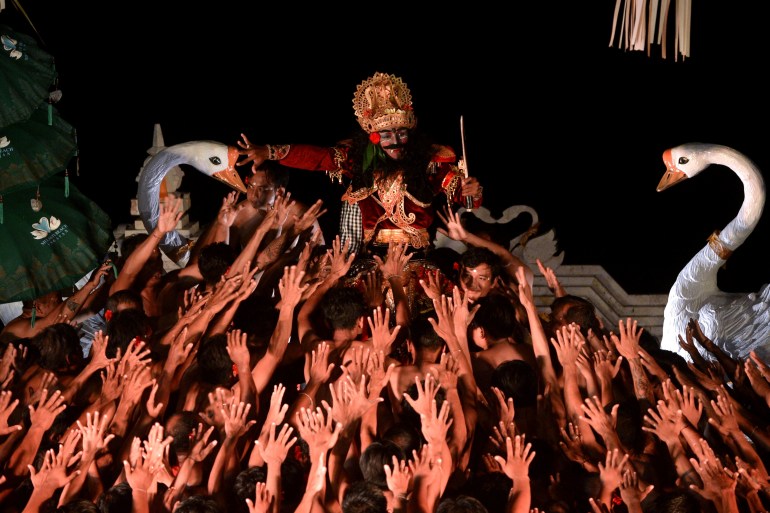
The global tourism monster that once fed Bali will probably not rebound to 2019 levels until 2024, according to management consulting firm McKinsey & Company that made the prediction in June based on various scenarios that examined the effect of virus containment.
Observers in Bali feel the same way.
“History has shown that Bali is very resilient to disaster but the island will take another year or two to recover,” said Mark Ching, a director of the Tamora Group, a prominent property developer on the island. “It’s not just opening borders. People need to feel safe before they travel again.”

How Bali could build a better kind of tourism after the pandemic
Senior Lecturer in Tourism and Leisure, Bournemouth University
Professor of Marine Biology and Conservation, Bournemouth University
Disclosure statement
Rick Stafford receives research funding from Interreg Europe and the Earthwatch Foundation
Jaeyeon Choe does not work for, consult, own shares in or receive funding from any company or organisation that would benefit from this article, and has disclosed no relevant affiliations beyond their academic appointment.
Bournemouth University provides funding as a member of The Conversation UK.
View all partners
COVID-19 has hit tourism-reliant destinations hard . The Indonesian island of Bali, for example, where 70% of the population depend on tourism , has seen extensive job and income losses since it closed its borders in April.
The economic impact so far has been greater than that of the Bali bombings of 2002, with losses of around 9.7 trillion rupiah (about £551.3 million) a month.
In the past, the island’s image as a peaceful paradise with a rich cultural and religious heritage has made it a highly resilient tourist destination. Bali recovered swiftly in the wake of past crises, both natural and man made, including the Gulf War (1990), a cholera outbreak (1995), Sars (2003) and bird flu (2007).
But without significant investment and diversification, there are widespread concerns that this crisis could be different .
A different approach may now be needed to save the tourism industry – and to make sure its benefits are more evenly spread. We believe that now is the time to adjust the model in Bali away from surf, parties, and yoga towards rural villages with high poverty rates across the island (especially the underdeveloped north-east).
To do this, government support is required to build small-scale tourism that will provide new livelihoods. This might include everything from dolphin watching and snorkelling trips, to food tourism and “experience tourism” focused on traditional fishing and farming.
Read more: African tourism has been put on ice by coronavirus – here's how some countries are reviving it
That support does not necessarily need to be in the form of cash. When we interviewed small-business representatives in Bali last year, they called not for financial subsidies, but for marketing training and access to tourism-research data.
As one entrepreneur told us: “Many local creative businesses are managed as informal family businesses. They lack knowledge in professional management and marketing skills.”
He also spoke of the need for improved collaboration between IT experts, business consultants, local universities and policymakers.
Yet there are important risks to consider when attempting to build a new kind of tourism. “Authentic” experiences can often be manufactured by large businesses, preventing regional economic development (other than occasional low-paid work) in the most deprived areas.
And without investment in tourist infrastructure, it would be too easy for tourists to prefer the manufactured version over the true “authenticity” on offer from local communities. Carefully considered investment, however, could lead to sustainable development.
According to Dr Luh Putu Mahyuni, a sustainable business consultant and economist at Undiknas University: “The pandemic provides a wake up call for Bali to foster […] new types of tourism such as gastronomic tourism.”
She told a webinar we hosted in May: “The tourism sector needs to develop products with other sectors so as to create a more resilient and sustainable economy.”
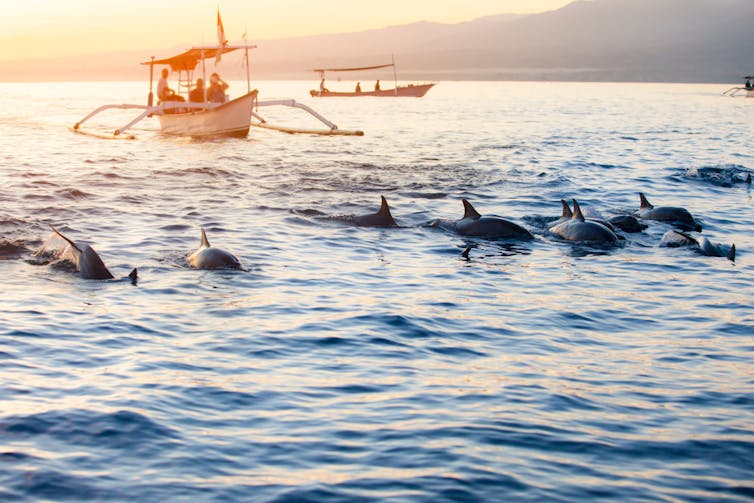
To boost that economy, the island should also consider a tourist tax, while reducing taxes on small-scale home-stays, and better regulating the presence of Airbnb. It also needs to restrict foreign ownership of property, limit destruction of viable farmland and limit business sizes in the south of the island.
An island of opportunity
Notwithstanding all the devastation it has caused, COVID-19 has given the world an opportunity to pause and reflect on how things may change in its aftermath . The tourism industry in Bali (and many other places) is no exception.
For tourism is often seen as a solution to all kinds of problems, from economics to conservation. But as our research has shown, unless tourist money is kept in the local community, the benefits do not materialise .
And besides the major financial concerns on Bali, and the need for a tourism-led recovery, the authorities must also face up to deeply entrenched levels of structural inequality. Poverty, homelessness and dispossession existed long before the pandemic.
The island must learn from what happened 18 years ago, when the bombings led to job losses and increased rates of depression, alcoholism and crime . And we hope that Bali can use the current crisis as an opportunity to look at the causes of such social problems, rather than the symptoms . To move on and build a more resilient island, where responsible tourism plays a major role in alleviating poverty.
- Bali bombing
- Coronavirus

Clinical Trial Manager

PhD Scholarship

Senior Lecturer, HRM or People Analytics

Centre Director, Transformative Media Technologies

Postdoctoral Research Fellowship
- Skip to main content
- Keyboard shortcuts for audio player
Bali reopens to foreign travelers as COVID-19 surge subsides
The Associated Press

A beach vendor sets chairs as he waits for customers in Kuta beach in Bali, Indonesia, on Thursday. The Indonesian resort island of Bali welcomed international travelers to its shops and white-sand beaches for the first time in more than a year Thursday - if they're vaccinated, test negative, hail from certain countries, quarantine and heed restrictions in public. Firdia Lisnawati/AP hide caption
A beach vendor sets chairs as he waits for customers in Kuta beach in Bali, Indonesia, on Thursday. The Indonesian resort island of Bali welcomed international travelers to its shops and white-sand beaches for the first time in more than a year Thursday - if they're vaccinated, test negative, hail from certain countries, quarantine and heed restrictions in public.
DENPASAR, Indonesia — The Indonesian resort island of Bali reopened for international travelers to visit its shops and white-sand beaches for the first time in more than a year Thursday — if they're vaccinated, test negative, hail from certain countries, quarantine and heed restrictions in public.
However, foreign visitors may be slow to arrive. No international flights to Bali were scheduled on the first day of the reopening and a tourism official forecast travel would pick up in November.
Bali's airport will welcome new foreign arrivals from 19 countries that meet World Health Organization's criteria such as having their COVID-19 cases under control, Luhut Binsar Pandjaitan, the government minister who leads the COVID-19 response in Java and Bali, said in a statement late Wednesday.
He said all international flight passengers must have proof they've been vaccinated two times, test negative for the coronavirus upon arrival in Bali and undergo a 5-day quarantine at designated hotels at their own expense. They'll also have to follow stringent rules at hotels, in restaurants and on beaches.
"We have to do this with caution because we need to stay alert," Pandjaitan said.
President Joko Widodo credited Bali's high vaccination rate for the decision to reopen. The country's COVID-19 caseload has also declined considerably; Indonesia has had around 1,000 cases a day in the past week after peaking around 56,000 daily in July.
Tourism is the main source of income on the idyllic "island of the gods" that is home to more than 4 million people, who are mainly Hindu in the mostly Muslim archipelago nation. Bali's tourist areas were deserted two decades ago after visitors were scared off by deadly terror attacks that targeted foreigners, but the island has worked to overcome that image.
More than 6 million foreigners arrived in Bali each year prior to the pandemic.
Foreign tourist arrivals dropped six-fold from 6.2 million in 2019 to only 1 million in 2020, while 92,000 people employed in tourism lost their jobs and the average room occupancy rate of classified hotels in Bali was below 20%. Statistics Indonesia data showed the island's economy contracted 9.31% year-on-year last year.
After closing the island to all visitors early in the pandemic, Bali reopened to Indonesians from other parts of the country in the middle of last year. That helped the island's gross domestic product grow a modest 2.83% in the second quarter this year, ending five consecutive quarters of contraction.

An airport worker marks queue line for the reopening of International Ngurah Rai Airport in Bali, Indonesia, Thursday. Firdia Lisnawati/AP hide caption
An airport worker marks queue line for the reopening of International Ngurah Rai Airport in Bali, Indonesia, Thursday.
The July surge , fueled by the delta variant, again totally emptied the island's normally bustling beaches and streets. Authorities restricted public activities, closed the airport and shuttered all shops, bars, sit-down restaurants, tourist attraction spots and many other places on the island. It reopened to domestic travelers in August.
Sang Putu Wibawa, the general manager at Bali's Tandjung Sari Hotel, said only two of its 40 rooms were occupied on average and he hoped the reopening would help the occupancy rate back to normal.
"We have been waiting for this moment for so long," he said. "This outbreak has hammered the local economy ... we are very excited to welcome foreign guests by observing health protocols."
Widodo said deciding to reopen Bali was based on its high vaccination rate as well as wanting to revive its economy. He said more than 80% of the Bali population has been fully vaccinated.
"Based on this situation, I am optimistic and we have decided to reopen international flights to Bali," Widodo wrote in his official Instagram on Saturday.
Overall, 59.4 million of Indonesia's 270 million people are fully vaccinated and another 43.2 million are partially vaccinated. Indonesia has confirmed more than 4.2 million cases and 142,811 deaths from COVID-19, the most in Southeast Asia.
Tourists from 19 countries are now able to visit the Bali and Riau islands provinces — Saudi Arabia, United Arab Emirates, New Zealand, Kuwait, Bahrain, Qatar, China, India, Japan, South Korea, Liechtenstein, Italy, France, Portugal, Spain, Sweden, Poland, Hungary, and Norway.
The tight timing is one reasons tourists were not immediately arriving, said Putu Astawa, head of the Bali Tourism Office
Airlines need time to schedule flights to Bali, while tourists need time to arrange travel documents such as tickets, insurance and virus tests as well as their five-day quarantine accommodations.
He predicted new visitors would start coming in early November.
Bali reopens to international visitors as coronavirus surge subsides
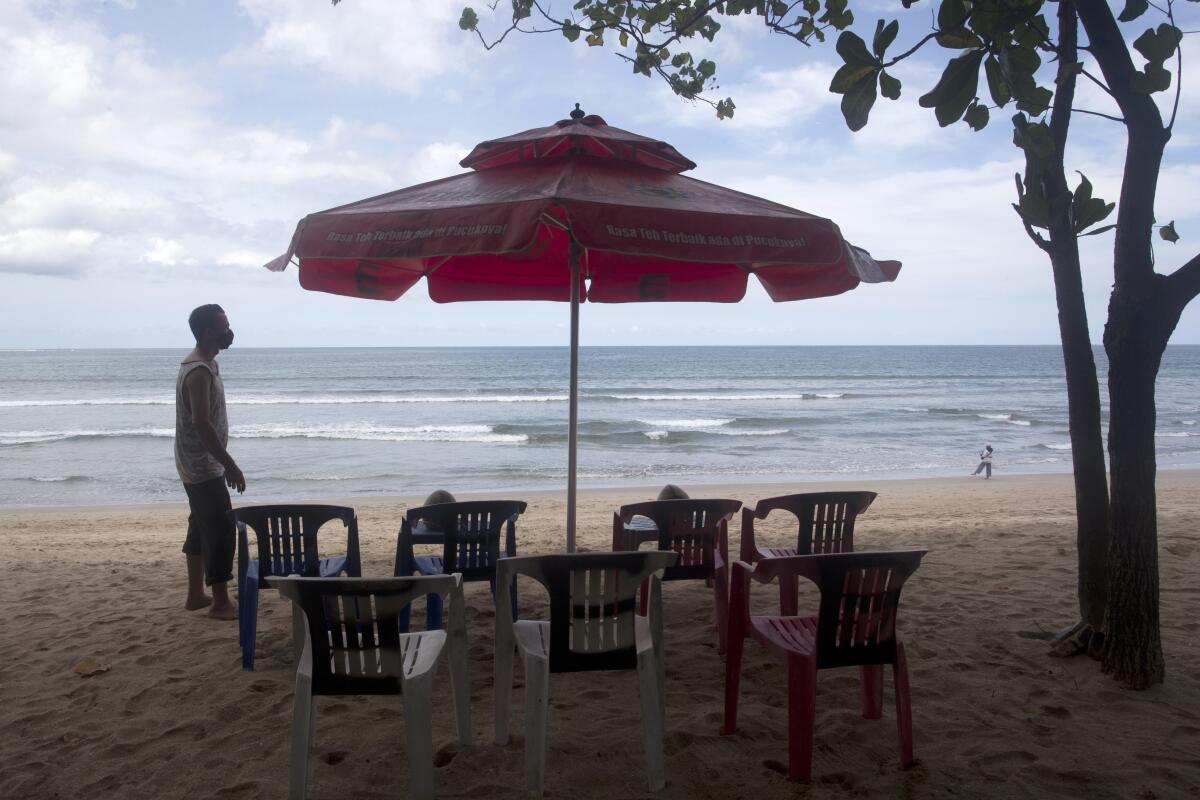
- Copy Link URL Copied!
The Indonesian resort island of Bali reopened to international travelers for the first time in more than a year Thursday — as long as they’re vaccinated against COVID-19, test negative for the coronavirus, hail from certain countries, spend some time in quarantine and heed public restrictions.
However, foreign visitors may be slow to arrive. No international flights to Bali were scheduled on the first day of the reopening. A tourism official forecast that travel would pick up in November.
Bali’s airport will welcome foreign arrivals from 19 countries that meet such World Health Organization criteria as having their coronavirus caseloads under control, Luhut Binsar Pandjaitan, the government minister who leads the COVID-19 response in Java and Bali, said in a statement late Wednesday.
He said all international flyers must have proof they’ve been double-vaccinated, test negative for the coronavirus upon arrival in Bali and undergo a five-day quarantine at designated hotels at their own expense. They’ll also have to follow stringent rules at hotels, in restaurants and on Bali’s famed white-sand beaches .
“We have to do this with caution because we need to stay alert,” Pandjaitan said.
Indonesian President Joko Widodo credited Bali’s high vaccination rate for the decision to reopen. The country’s coronavirus caseload has also declined considerably; Indonesia has had around 1,000 cases a day in the past week after peaking at about 56,000 daily in July .
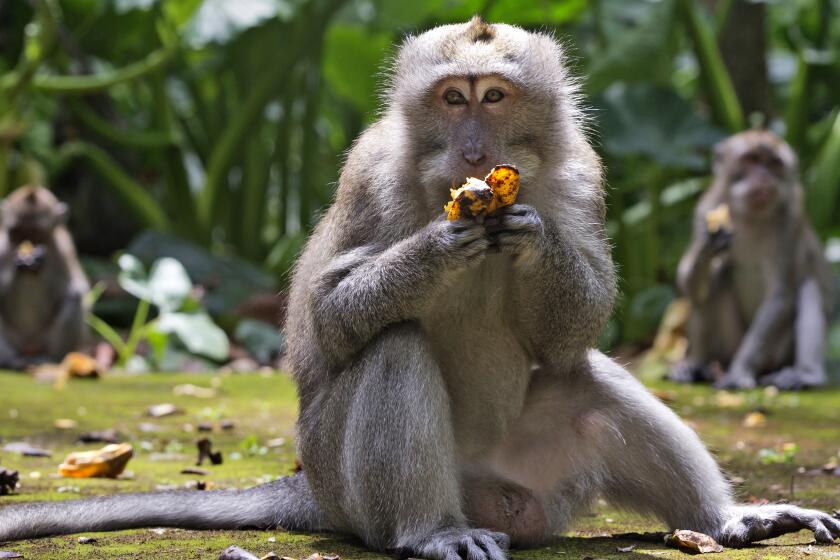
World & Nation
With no tourist handouts, hungry Bali monkeys raid homes
Deprived of food brought by tourists now kept away by the coronavirus, hungry monkeys on the island of Bali have taken to raiding villagers’ homes.
Sept. 5, 2021
Tourism is the main source of income on Bali, the idyllic “island of the gods” that is home to more than 4 million people, who are mainly Hindu in the mostly Muslim archipelago nation. Bali’s tourist areas were deserted two decades ago after visitors were scared off by deadly terror attacks that targeted foreigners , but the island has worked to overcome that image.
More than 6 million foreigners arrived in Bali each year prior to the pandemic.
Foreign tourist arrivals dropped from 6.2 million in 2019 to 1 million in 2020, while 92,000 people employed in tourism lost their jobs, and the average room-occupancy rate of classified hotels in Bali was below 20%. Statistics Indonesia data showed that the island’s economy contracted 9.31% year-on-year in 2020.
After being closed to all visitors early in the pandemic, Bali reopened to Indonesians from other parts of the country in the middle of last year. That helped the island’s economy grow a modest 2.83% in the second quarter this year, ending five consecutive quarters of contraction.

Bali nightclub bombing suspects in Guantanamo are charged at protracted arraignment
Three men held at the Guantanamo Bay detention center have been formally charged in the 2002 Bali nightclub bombings and other plots in Southeast Asia.
Sept. 1, 2021
The July coronavirus surge, fueled by the Delta variant, again totally emptied the island’s normally bustling beaches and streets. Authorities restricted public activities, closed the airport and shuttered all shops, bars, sit-down restaurants, tourist attractions and many other places on the island. It reopened to domestic travelers in August.
Sang Putu Wibawa, the general manager at Bali’s Tandjung Sari Hotel, said only two of its 40 rooms were occupied on average. He hopes the reopening will help return the occupancy rate to normal.
“We have been waiting for this moment for so long,” he said. “This outbreak has hammered the local economy. ... We are very excited to welcome foreign guests by observing health protocols.”
Widodo said that the decision to reopen Bali was based on its high vaccination rate as well as wanting to revive its economy. He said more than 80% of Bali’s population has been fully vaccinated.
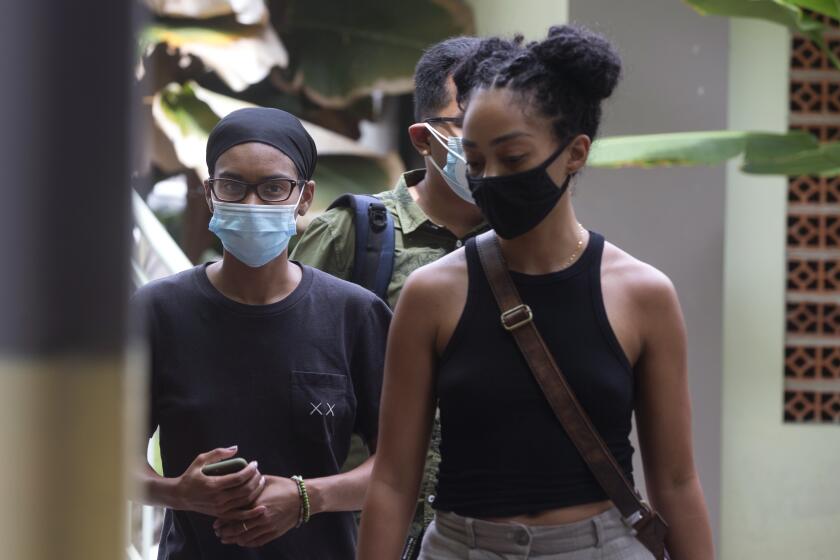
Former L.A. woman to be deported from Bali after tweeting that it’s LGBTQ-friendly
A former L.A. resident is being deported from the Indonesian island of Bali following her tweets celebrating it as a low-cost, LGBTQ-friendly place.
Jan. 20, 2021
“Based on this situation, I am optimistic, and we have decided to reopen international flights to Bali,” Widodo wrote on his official Instagram account Saturday.
Overall, 59.4 million of Indonesia’s 270 million people are fully vaccinated and another 43.2 million are partially vaccinated. Indonesia has confirmed more than 4.2 million cases and 142,811 deaths from COVID-19, the most in Southeast Asia.
Tourists from 19 countries are now able to visit the Bali and Riau islands provinces: Saudi Arabia, United Arab Emirates, New Zealand, Kuwait, Bahrain, Qatar, China, India, Japan, South Korea, Liechtenstein, Italy, France, Portugal, Spain, Sweden, Poland, Hungary and Norway.
More to Read
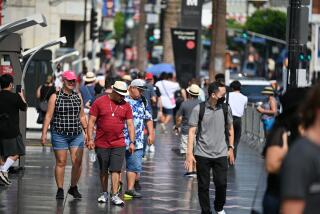
International tourism to L.A. still lags behind pre-COVID era. There’s a push to court more visitors
Sept. 19, 2023


China to reopen to tourists and resume issuing all travel visas Wednesday
March 14, 2023

Lunar New Year tourism hopes fizzle as Chinese travelers stay home
Jan. 19, 2023
Start your day right
Sign up for Essential California for news, features and recommendations from the L.A. Times and beyond in your inbox six days a week.
You may occasionally receive promotional content from the Los Angeles Times.
More From the Los Angeles Times
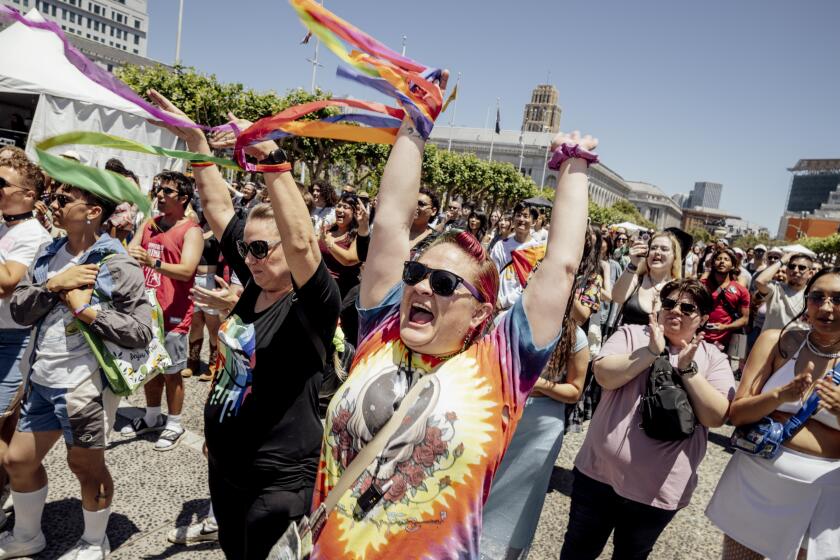
LGBTQ+ Pride Month culminates with parades in New York, San Francisco and beyond
June 30, 2024
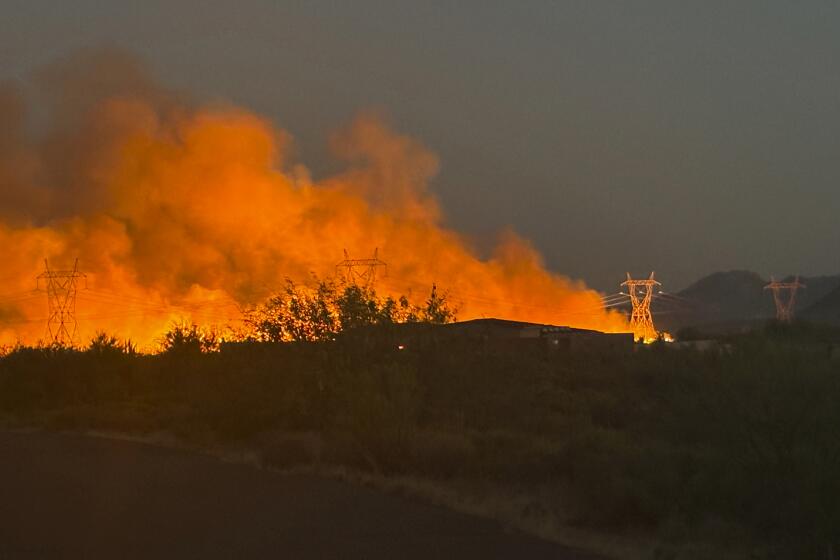
Evacuation orders lifted for some Arizona residents forced from their homes by a wildfire

Biden allies rally behind him with public show of support as he spends family time at Camp David
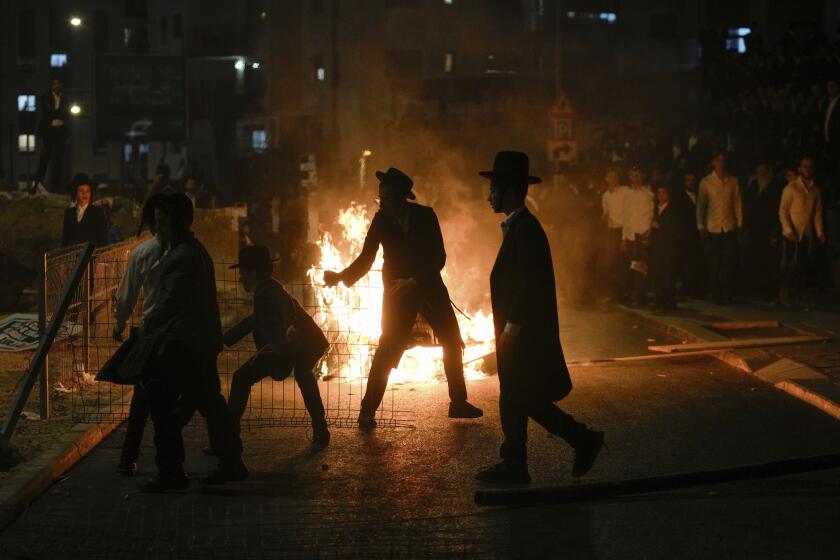
Ultra-Orthodox protest against order to enlist in Israeli military turns violent in Jerusalem
- Share full article
Advertisement
Supported by
Bali reopens to foreign tourists, but government rules keep them away.

By Richard C. Paddock and Dera Menra Sijabat
Not a single international flight carrying tourists has landed in Bali, one of the world’s most popular destinations, and none are scheduled, even though Indonesia announced more than a week ago that the popular island was finally open again for tourists.
Arriving foreign tourists must spend their first five days in quarantine, but so far, hotels offering quarantine on the island report that no one has booked a room.
“We have been waiting every day for a week,” said Fransiska Handoko, vice chair of the Bali Hotels Association. “Where are they?”
Before the pandemic, tourism accounted for more than half of Bali’s economy but the island has been closed to foreign tourists since April 2020, leaving many workers desperate for income.
The Indonesian government abruptly reopened Bali on Oct. 14 to tourists from 19 countries who are fully vaccinated and test negative for the coronavirus. But it gave hotels and airlines little time to prepare and included numerous restrictions that make a Bali holiday unappealing.
Hotel operators say they have received many inquiries from abroad, but once they explain the rules, the callers lose interest.
One factor is the required five days of quarantine. Most Bali tourists come for a week, travel operators said, and don’t want to spend most of their visit confined to a hotel room.
“Two days’ holiday and spending most of the time in quarantine is nonsense,” said Wayan Adika, a reservation clerk at Bali Golden Tour, who has been fielding calls from around the world. “They think it’s better to wait until the quarantine requirement is revoked.”
Requiring even minimal quarantine has left Bali at a disadvantage in competing with other destinations. Thailand, for example, announced on Thursday that it would accept fully vaccinated tourists from 46 countries without quarantine starting Nov. 1.
Adding to the cost of a Bali trip, Indonesia will no longer issue free tourist visas. Instead, tourists must pay in advance for a visa that can cost $65 or more and entails a complicated application process.
Another deterrent for families has been a regulation barring children under 12 from entering Bali because they cannot be vaccinated. That rule will be lifted on Sunday.
Tourists arriving from the 19 nations, including China, India and Japan, must arrive on flights directly from their countries of origin. But most countries on the list, especially those in Western Europe, do not offer such flights.
Among those listed is the tiny European country of Liechtenstein, with a population of 38,000. Yet Indonesia excluded nearby Australia, whose travelers once flocked to Bali.
The regulations also are not easy on airlines. Indonesians traveling to Bali from overseas must fly first to Jakarta, leaving only non-Indonesian travelers to fill the Bali flights.
So far, no airline has scheduled a flight to bring tourists to Bali from abroad, according to a Bali airport spokesman, Taufan Yudhistira.
“We hope the government will re-evaluate the regulations,” said Rai Suryawijaya, Bali chairman of the Indonesian Hotel and Restaurant Association. “It is not productive when we are open but nobody is coming. If we are really open, we should make it easy.”
Richard C. Paddock has worked as a foreign correspondent in 50 countries on five continents with postings in Moscow, Jakarta, Singapore and Bangkok. He has spent nearly a dozen years reporting on Southeast Asia, which he has covered since 2016 as a contributor to The New York Times. More about Richard C. Paddock

- Edition 144: Apr-Jun 2021
- Exhibited as losers
Rising and falling in Bali during the pandemic
Versi bh. indonesia, anton muhajir.
This year’s new year celebrations at Pantai Segara, Sanur, were unusually quiet. A sound system had been set up, but remained silent. Wooden chairs were flipped upside down and draped over tables. Customers at the beachside restaurants wandered home early, leaving this once buzzing tourist area quiet.
About 15 minutes prior to the arrival of the new year, the atmosphere was still lively. It was busy with locals. The waiters were busy delivering their orders. The DJ played the music beneath flashing lights.
But the party was brought to an abrupt halt. Police, together with the local pecalang – one of the local Balinese security enforcers – arrived on the scene. They asked the managers of the café to shut the party down.
‘Sorry, sir, we can’t do it now. How will get people to pay?’, said the café’s owner.
‘These are the rules. The pandemic is still happening. We’re not allowed to gather in large numbers,’ said the pecalang.
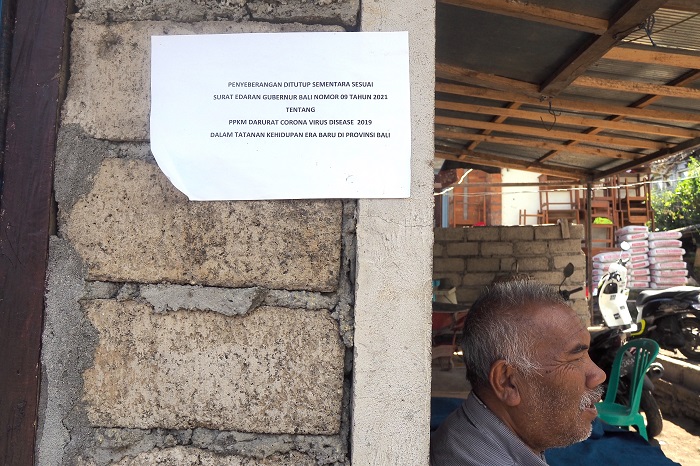
This joint operation used three regulations to prevent the New Year’s Eve party from taking place. There are three regulations regarding the holding of Christmas celebrations (2021) and New Year’s Eve (2021-22). These are the Internal Affairs Minister’s Instruction No.62, 2021; the Tourism and Creative Economy’s Minister’s Bill No.SE/2/M-K/2021 and the Balinese Governor’s Bill No.20 of 2021.
The three bills state the same thing: all businesses and tourist destinations are banned from holding New Year’s celebrations, either inside or outside. This includes the holding of parades, firecracker parties and fireworks.
So, there was no room for discussion. The manager asked the party-goers to return home. One-by-one they got up from their tables and left. The restaurant, which had only moments earlier been lively, quickly became quiet. The New Year’s party ended without a bang.
In other places, however, some people were still celebrating in a somewhat constrained manner, including at the beach next to one of the oldest hotels in Bali – the Grand Inna Bali Beach. Some of the guests at this hotel, which is owned by the Indonesian government and built in 1963, were setting off fireworks on the beach.
The fireworks launched into the dark, damp night air. There was a brief flash in the sky of colourful sparks. Then, everything was dark and quiet once more. After two years of the COVID-19 pandemic, the island of Bali still couldn’t see the light at the end of the tunnel.
Dramatic decline
The pandemic has hit Bali harder than other provinces of Indonesia. Since the first case of COVID-19 was identified in Indonesia in March 2020, the usually lively tourist atmosphere of Bali has dropped off dramatically. Tourism, which forms the basis of the Balinese economy, has died.
During the entire year of 2021, there were only 51 visits by foreign tourists to Bali. This figure, according to the Central Statistics Bureau, was a 99.95% drop off compared to the previous year. Between January-November 2020, there was around one million foreign tourists who visited Bali. This figure, was 83.26% lower than the previous year.
Data from the last two years shows the impact of the Pandemic. At least five million tourists were visiting Bali prior to the Pandemic: 5.7 million in 2017; 6 million in 2018 and 6.2 million in 2019. Without tourists coming to Bali, the Island’s economy is like a roller coaster after it has reached its highest point: it descends dramatically. The growth of the Balinese economy, which had been steadily declining – 6.16% in 2017, 6.10 in 2018 to 5.28 in 2019 – then fell off a cliff in 2020, at -12.32% and -2.91 in 2021.
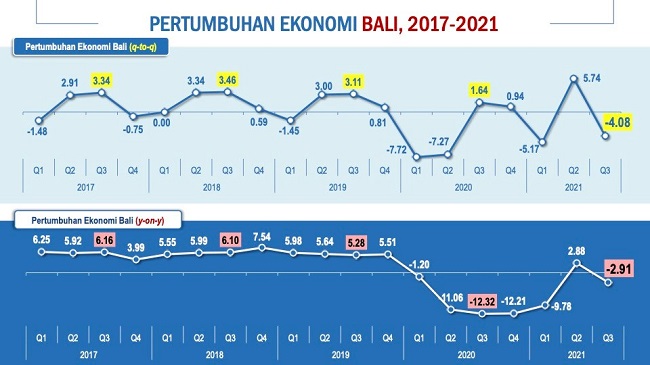
At first glance, this data doesn’t lie. The tourist hotspots throughout Bali have remained totally dead. Many of the hotels, restaurants, cafes and souvenir shops in Kuta and Seminyak are still closed. Their doors are locked as the dust gathers.
It’s not only like this in southern Bali, but in other parts of Bali also. For example, Pantai Amed, which is usually busy with foreign tourists, was completely quiet. The number of foreign tourists could be counted on one hand. When in fact, the end of the year, like the middle of the year, is one of the peak seasons of tourist visits to Bali.
‘For the last two years, we’ve had no guests. I think I’m just going to rent it out,’ said Wayan Miskin, one of the managers of a hotel in Amed.
Relative success
Bali’s tourism sector is yet to recover from the impact of the pandemic which cannot be separated from local, national and global developments.
The management of COVID-19 in Indonesia, including Bali specifically, has been relatively successful. The spread of the virus has been relatively contained. On the 31 st December 2021, for example, the increase of Covid-19 cases throughout Indonesia was ‘only’ 180 cases. This is well below the number of cases at the height of the second wave on 15 th July 2021 which reached 56,757 in one day.
The situation in Bali is similar. At the start of the year, in early January 2022, there were no recorded cases. The previous August, though, there was more than 1,900 reported cases.
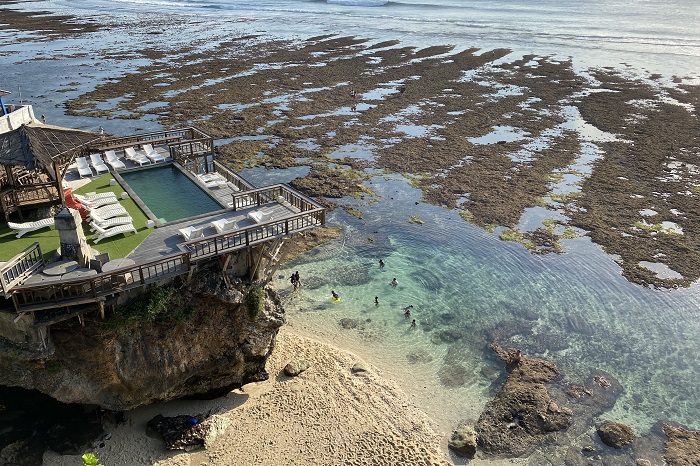
After the situation had been brought under control, vaccination rates were also increasing. In the first week of January 2022, the Balinese government had vaccinated approximately 3.5 million residents of Bali – more than the initial target of 3.4 million. As many as 3.1million second doses had been distributed, or roughly 91.35%.
Despite the stabilisation of the pandemic, tourists were yet to return to the island. ‘The situation hasn’t yet recovered, but whatever the case, life has to go on,’ said Wayan Willy, a driver working in the tourism industry.
Willy runs a tourist agency with some friends. They serve foreign and domestic tourists in Bali. Before the pandemic, most of their clients were from overseas. But, nowadays, they rely on domestic tourists. Their clients are few and far between.
The situation is the same in Kuta. According to the BPS, last October, the occupation of hotels was only 17.73%. This figure was far below what is required for a hotel to stay in operation.
‘The breakeven point for a hotel is 40% occupation. If it is lower than 10%, it is not even possible to cover the operational costs,’ said IGN Rai Suryawijaya, the Head of the Tourism, Restaurants and Hotel Association of Indonesia (PHRI) of Kabupaten Badung.
According to Rai, this is the lowest point in Balinese tourism. Bali has been through two bombings (2002 and 2005) and a volcanic eruption in 2017. In these cases, however, thanks to governmental support and the international community, Bali has been able to recover quickly.
‘Those situations were different. Nowadays, everyone is having difficulty, owing to the COVID-19 pandemic.’
Up and down
Like the title of George Orwell’s first novel, Down and Out in Paris and London , so too are the conditions of the tourism industry in Bali. The same applies to the governmental policies. The local and national governments have to tried to resuscitate the industry through various means. In mid-September 2020, when the number of COVID-19 cases was still rising, the national government invited social media influencers to help promote tourism in Bali.
Through the program, We Love Bali, the Bali Tourism Bureau invited 44,000 social media user s to come to Bali. They were expected to promote their visit to Bali based on its cleanliness, health, safety and its environmental qualities.
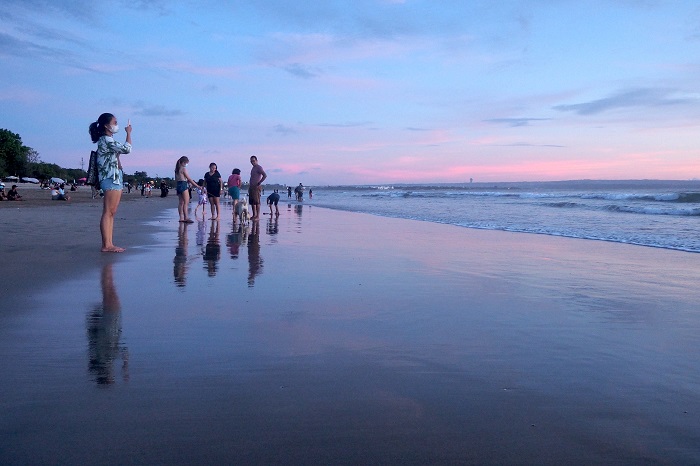
One year later, the national government also initiated the program, Working from Bali (WFB). Government officials, otherwise based in Jakarta, held some of their meetings in Bali. The large and luxurious hotels in the elite areas of Nusa Dua and Kuta were filled with civil servants from Jakarta, at a time when COVID-19 cases in Jakarta were skyrocketing.
Made Rentin, Secretary of the COVID-19 Task Force pointed to this policy as the reason for the increase in COVID-19 cases in Bali in the middle of 2021. After being relatively contained, cases on the island took off and reached a peak in August 2021. The WFB program was scrapped after the number of cases in Bali continued to increase.
When the situation started to improve, the government tried once more to encourage tourists to visit Bali. On 14 October 2021, the national government re-opened Bali for international flights. President Joko Widodo himself made the announcement. Previously, owing to the pandemic, international flights were only permitted to land at Soekarno Hatta airport in Cengkareng (Banten) and Sam Ratulangi Airport, Manado (Northern Sulawesi).
The reopening of the airport for international flights marked a new moment of hope for Bali. I Wayan Koster, the Governor of Bali, was optimistic that the opening of international flights would bring 40,000 foreign tourists to Bali. According to Koster, hotel rooms were being booked .
But Koster’s hopes weren’t realised. The international re-opening of flights had no impact. Still, the number of foreign tourists could be counted on one hand.
‘Koster talks rubbish,’ said Made Suarta a ride share driver.
Same old, same old
According to Suarta, the empty rhetoric of the government in reviving the Balinese economy is also evident in the government’s plan, Mapping the New Balinese Economy (Peta Jalan Ekonomi Kerthi Bali Menuju Bali Era Baru). President Widodo launched the plan on 3 December 2021.
In this plan, the Indonesian government offered a new vision of Bali as green, resilient and prosperous. This concept is a reflection of the Balinese economic situation which is highly dependent on tourism. There are six basic strategies, including that of ‘Productive Bali’, which incorporates agricultural revitalisation, fisheries and marine tourism.
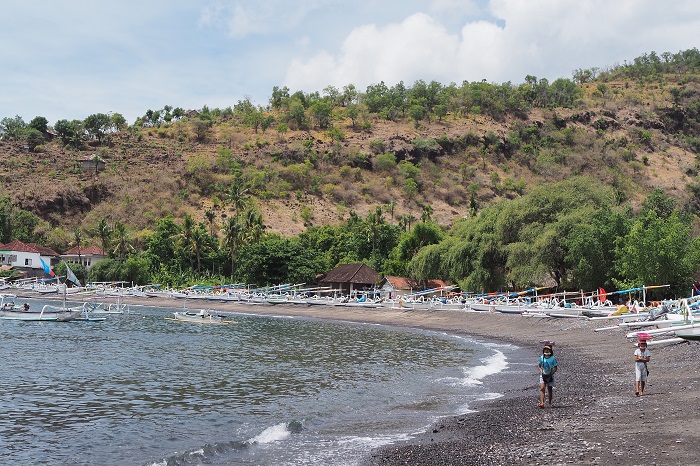
According to the plan, Bali's economy is targeted to grow 7.7% by 2045. This transformation is aimed at increasing the agricultural sector by 5.4% in the same year.
However, hoping that Bali can create a new economic sector other than that of tourism is a daydream. ‘The government doesn’t have another concept at the moment,’ says Willy. The evidence is in the Mapping the New Balinese Economy plan. The government, has, at the same time, introduced the Tourism Development Plan of Ubud, Tegalalang and Payangan (Ulapan). Tourism, yet again.
The launch of the roadmap Mapping the New Balinese Economy took place on Serangan Island; an island reclaimed during the New Order era, between 1994-1998. At that time, activists protested against island reclamation in the area to the south of Denpasar. Serangan became a monument to the failure of mass tourism development in Bali.
Now, this island has become the site of the launch of new economic jargon from the government about the recovery of the tourism sector. As such, for critically engaged citizens of Bali, including Wayan Willy and Made Suarta, the government hasn’t learned from alternative economic sources apart from mass tourism.
Nyoman Sukma Arida, of the Tourism Faculty at Udayana University in Denpasar, states that Bali has to be prepared to face new trends in tourism once the pandemic is over. ‘Bali has to create a high-quality tourism industry connected with village-life, the environment and health,’ said the PhD graduate from Gadjah Mada University of Yogyakarta.
If not, according to Sukma, the Balinese government will only repeat the mistakes in looking for alternatives beyond mass tourism. In fact, it is proven that mass tourism is a highly precarious industry. It is vulnerable to fluctuating global circumstances.
‘Tourism in Bali is like a sand castle. It is beautiful, but it can be washed away by the waves,’ added Willy.
Anton Muhajir ( [email protected]) is a Bali-based freelance journalist and blogger.
Inside Indonesia 147: Jan-Mar 2022
Latest articles, essay: what remains of the 1998 tragedy for the post-1998 generation.
Jun 26, 2024 - ALVINO KUSUMABRATA
Hearing about my mother's experiences in May 1998 became a pivotal moment that has shaped my life.
Obit: Bob Muntz, 1947-2024
Jun 24, 2024 - HELEN PAUSACKER
Memeing the precarity of Indonesian startup workers
Jun 20, 2024 - IBNU NADZIR
Beyond the hype, workers in this booming industry are seeking not only comic relief, but real improvements in their conditions. An Instagram account is helping with both.
Dancing into the elections
Jun 17, 2024 - VICTORIA WINATA & MONIKA WINARNITA
The replacement of dangdut with TikTok dances in the 2024 elections heralds a massive demographic shift in Indonesian political campaigning and beyond
Labouring in vain?
May 03, 2024 - HASNA A. FADHILAH
The Labour Party (Partai Buruh) was revived in the wake of opposition to the Omnibus Law on Job Creation, but failure in the 2024 election shows they failed to connect...
Subscribe to Inside Indonesia
Receive Inside Indonesia's latest articles and quarterly editions in your inbox.

Lontar Modern Indonesia

A selection of stories from the Indonesian classics and modern writers, periodically published free for Inside Indonesia readers, courtesy of Lontar.
Bali's tourism-dependent economy is 'collapsing' due to coronavirus travel bans
Mangku Nyoman Kandia has been a tour guide in Bali since 1984. He says he's lost track of the number of people he has taken on tours from around the world, but nothing has prepared him for this.
"No tourist, no money," he said simply.
There are few places in the world where hospitality and tourism are as ingrained in people's psyche and development than Bali.
The Indonesian island's colourful culture and religious norms have been shared with millions since it was first discovered by international travellers.
But earlier this week, the Indonesian Government declared a state of emergency due to the global coronavirus pandemic .
It announced it would ban all foreign nationals , except for diplomats, permanent residents and humanitarian workers, from entering the country.
Many of Bali's 4 million residents have been relying on the tourism industry for generations, but with people staying home due to the coronavirus travel restrictions, its residents are struggling.
"The coronavirus has collapsed the Balinese economy … it's been a steep drop since [mid-March] when social-distancing measures were put in place," Mr Kandia said.
"[Economically] it's currently much worse than the Bali bombings and the Mount Agung eruptions."
Preliminary figures from Bali's international airport shared with the ABC show a steep drop in both arrivals and departures in the last two weeks of March.
On April 1, only four international flights arrived and departed from the airport — a more than 95 per cent drop compared to the same day last year.
In 2019, there were more than 1.3 million Australians who travelled to Bali — a love affair stemming back to the 70s that has seen many return for cheap holidays, retirement or for business opportunities.
Now the bustling street vendors have shut up shop, the once-packed beaches are deserted. With many hotels closed, thousands have been left to grapple with a new reality.
I Ketut Ardana, head of Bali's branch of the Indonesian National Organisation for Tours and Travel (ASITA), told the ABC almost all tourists had left the island, and those left behind were stuck and hoping to get home.
"Eighty per cent of people in Bali rely on tourism whether directly or indirectly," he said.
"All of us in the industry are really struggling right now, what we're waiting for is for this pandemic to end."
Relying on odd jobs and donations
Mr Kandia is now living off his dwindling savings and doing odd jobs including construction work, sweeping streets, and driving ride-shares to stay afloat.
He said there were around 7,000 tour guides in Bali like him who were out of a job, and like many others in Asian nations, stay-at-home orders were hard to follow when living hand-to-mouth.
"From [earlier this week] good Samaritans have been giving out boxes of rice to 500–1,000 gig economy drivers," he said.
"Hotels, villas and restaurants are starting to close, there have been no activities."
Kevin Adhipramana was only three months into his two-year contract at a five-star resort in Bali's tourist hotspot of Kuta before he, and hundreds of others, were told the hotel would close indefinitely.
"We were at less than 10 per cent occupancy before the hotel finally announced it would close on April 1," he told the ABC.
"I'm now looking for any available work. Regardless of the situation, we all still have daily needs."
'It's time to get creative to survive'
Hospitality is not the only industry taking a hit. Bali has become an increasingly popular location for destination weddings in recent years, but the outbreak has forced many couples to cancel their ceremonies.
Govinda Rumi has been a wedding photographer for almost a decade. He told the ABC most people had cancelled their weddings this year.
"Most of my friends who work in international weddings rely solely on tourists," he told the ABC.
"There's zero income … I cannot see another wedding for me this year, because even if it gets better, people aren't really spending that much money."
He said there were around 5,000 wedding photographers in Bali, but there were also many wedding planners, florists, caterers, event hire companies and decorators who were now out of work.
"Photographers are staying alive by setting up home kitchens, or delivering food … so it's time to get creative to survive," Mr Rumi said.
Pandemic a 'lesson' for tourist-driven economies
Tourism accounts for 10 per cent of Indonesia's total workforce, employing more than 12 million workers, many of which are in Bali, according to 2018 data from the World Tourism and Travel Council.
The Indonesian Government announced three separate economic stimulus packages worth a total of $40 billion to keep Indonesia's economy afloat during the pandemic, including tax breaks and specific subsidies for companies and individuals.
They have also announced an online upskill and training initiative with financial benefits for those who are economically impacted by COVID-19 in three regions, including in Bali.
However, there are many people who still cannot access the program, or do not qualify, leaving it up to local councils to provide food handouts to those in need.
Sam Huang, professor of tourism and services marketing at Edith Cowan University, said the "unprecedented" devastation on the tourism industry extended much further than Bali.
"Tourism businesses are finding a very hard time now as a lot of national and state borders are closed and people's mobility is tightly controlled to curb the spread of the coronavirus," Professor Huang said.
"The financial costs would be huge."
He said in Australia, the income from inbound tourism could drop by two-thirds compared to last year.
"For nations and regions that heavily rely on tourism in their economic structure, the loss is even bigger," he said.
Professor Huang added that tourism industries may only be able to recover after two to four months from the time the pandemic is declared over by the World Health Organisation.
"This pandemic gives us a lesson to reconsider what the appropriate proportion of tourism in a country or region's economy [is]," he said.
- X (formerly Twitter)
Related Stories
'the horse has bolted': indonesia closes borders to foreigners as national emergency declared.
Why is Indonesia's coronavirus death rate the highest in the world?
The next red zones. Which countries could see coronavirus infection rates skyrocket?
- Business, Economics and Finance
- Diseases and Disorders
- Economic Globalisation
- Epidemics and Pandemics
- Government and Politics
- Tourism and Leisure Industry

COMMENTS
The Covid pandemic decimated the global economy — but few places struggled as badly as our beloved Bali, with locals fighting to survive. Natalie Wolfe News Reporter @natwolfe94
Bali has suffered shocks to its tourism industry before, like the 2002 Bali bombings and the 2017 eruption of Mount Agung, which temporarily slashed tourist numbers. But the COVID-19 pandemic ...
Dekha Dewandana ran a thriving 'homestay' tourism property in Bali, and received UN-supported training which has helped him to maintain a high standard of hospitality. When COVID-19 hit Indonesia, his business was pushed to the verge of collapse and, after a bruising two-year period, it's now slowly recovering. "When my parents passed ...
Six weeks after reopening, Bali wonders where the tourists are. Indonesian island's unique culture and natural beauty not enough to overcome stress and worry of travel during COVID.
COVID-19 has hit tourism-reliant destinations hard.The Indonesian island of Bali, for example, where 70% of the population depend on tourism, has seen extensive job and income losses since it ...
COVID-19 has made the difference. Official figures claim there are just over 900 active cases in Bali, but Dean sees the impact of the virus in every empty table and every silent street. "When ...
Foreign tourist arrivals dropped six-fold from 6.2 million in 2019 to only 1 million in 2020, while 92,000 people employed in tourism lost their jobs and the average room occupancy rate of ...
"One of the reasons for the optimism behind Bali's readiness was due to Covid-19 vaccination having reached 99 percent for the first dose and 90 percent for the second dose," the Tourism and ...
Bali's beaches have been fairly deserted since travel restrictions were put in place last year. The much anticipated re-opening of Indonesia's famed tourist island Bali has seen a slow start, with ...
Due to strict border control measures and a closed airport, Bali went from receiving millions of international visitors to welcoming just 45 in 2021. Ad Feedback. Compare that to about 6.2 million ...
It is estimated that prior to the pandemic around 70 per cent of the economy was linked to tourism and over half of all jobs. As Anton Muhajir details in his article in this edition, when compared to past crises, including the 2002 Bali Bombings and 2017 Mt Agung eruption, the economic and social impact of the pandemic has been unprecedented ...
The travel restrictions have slammed Bali's tourism industry. During the first half of the year, the island received 1.1 million foreign tourists, almost all of them before the pandemic.
Like most major tourism hotspots around the world, Bali suffered vast economic turmoil during the Covid-19 pandemic. From more than 500,000 foreign visitors each month, arrivals slumped to double ...
Indonesia recently recorded two million Covid cases, attributed to increased holiday travel and the Delta variant. The lockdown will last two weeks and aims to reduce the number of cases to below ...
More than 6 million foreigners arrived in Bali each year prior to the pandemic. Foreign tourist arrivals dropped from 6.2 million in 2019 to 1 million in 2020, while 92,000 people employed in ...
The Indonesian government abruptly reopened Bali on Oct. 14 to tourists from 19 countries who are fully vaccinated and test negative for the coronavirus. But it gave hotels and airlines little ...
The year Bali tourism stopped. It was one of Bali's best kept secrets, then tourism boomed. Now COVID has forced locals back to nature. ... Taking a lesson from Bali during COVID-19.
Just 43 travelers from abroad visited during the first nine months of 2021, down from 6.3 million in all of 2019, according to Bali's statistics office. Monkeys that once feasted off tourist ...
Since the first case of COVID-19 was identified in Indonesia in March 2020, the usually lively tourist atmosphere of Bali has dropped off dramatically. Tourism, which forms the basis of the Balinese economy, has died. During the entire year of 2021, there were only 51 visits by foreign tourists to Bali.
Many of Bali's 4 million residents have been relying on the tourism industry for generations, but with people staying home due to the coronavirus travel restrictions, its residents are struggling ...
Tourism Minister Sandiaga Uno said the government is developing 'Bali experiences' on other islands to woo 1.3 million Chinese visitors this year. ... dance during a parade at the Bali Art ...